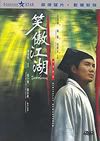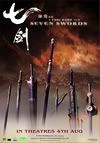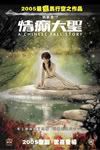|
A Hero Will Rise
The
Ang Lee’s martial arts extravaganza “Crouching
Tiger, Hidden Dragon (2000)” which swept four
Oscar awards including Best Foreign Film might have
reignite the wave back in 2001. For the last seven years,
the “wuxia” genre has been given a huge
revival. While it never matches the heydays back in
the Shaw classics era, the Hong Kong film industry has
been busy churning out “wuxia” genres in
recent times, a phenomenon not seen since the early
nineties.
“Wuxia”
films or films that involved the fantasy, pugilistic
world were a common treat in the 1960’s and 1970’s.
Stars liked Ti Lung, David Chiang, Wang Yu, Zheng Peipei
and the late Alexander Fu Sheng carved out an illustrious
career playing swordsman, pugilist and generals. King
Hu and Chang Cheh were some of the leading martial-art
directors back then. The one-armed swordman and the
golden sparrow were among the many memorable on-screen
characters spawned. With the closure of the iconic Shaw
production studio in 1985 and the rise of competitors
such as Golden Harvest, Cinema City, the “wuxia”
genre were temporary laid to rest and most of the actors
from Shaw stable either retired or pave their career
into television.
In
1990, Tsui Hark set the ball rolling again with Cantopop
King Sam Hui as the leading man in “Swordsman
(1990)”, the adaptation of one of Louis Cha’s
famous novel. A box-office hit at that time, it revolves
to a trilogy, the last being the horrendously mutilated
“The East Is Red (1993)” starring Brigitte
Lin. A whole slew of “wuxia” films followed
including the remake of “Dragon Inn (1992)”,
“Deadful Melody (1993)”, “Moon Warriors
(1993)”, Ronny Yu’s “The Bride with
White Hair (1993)”, the prolific Wong Jing’s
“Kungfu Cult Master (1993)”, Benny Chan’s
“The Magic Crane (1993)” and Wong Kar Wai’s
“Ashes of Time (1994)” just to name a handful.
Almost every single novels from Louis Cha, Gu Long and
Liang Yusheng were unearthed and make into movies and
serials.
By
1995, the Hong Kong film industry has scaled down their
production slate due to the popularity of the Hollywood
imports and the “wuxia” genre once again
went into hibernation. It did had a slight beep at the
radar with the success of Andrew Lau’s CG enhanced
epics, “Stormriders (1998)” and “A
Man Called Hero (1999)” but not really a notable
revival even though we heard plenty of noises from the
industry.
Flying
Ideas, Random Targets
Indeed,
Ang Lee is the man who deserves most of the credit after
his glorious winnings. His success gained the confidence
of investors and Tsui Hark shortly announced he is making
“The Legend of Zu (2001)”, a sequel to his
classic, “Zu Warriors (1983)”. The end result
was pathetic, “Zu” was a critically and
commercial flop. The plot was deemed befuddled at best
and it was over populated with cheesy CG effects, it
did nothing remarkable but expedites the failure of
Tsui’s career.
Then
came Zhang Yimou’s “Hero (2002)”,
the award-winning mainland director surprised the audience
with his original story of an assassin and his plotting
to murder the Emperor. Although snubbed at major awards,
it possessed lush photography, excellent technical aspects,
brilliant cast and beautifully choreography action pieces
making this a worthy effort to Lee’s film. However,
the above doesn’t apply to Zhang’s second
“wuxia” attempt, “The House of Flying
Daggers (2004)”. Technically, it’s wonderful
as usual but the plot was sadly half-baked and the audience
had a good laugh at the supposedly tragic ending.
Of
Myths & Empty Promises
The
following year, action duo Jackie Chan and Stanley Tong
brought us “The Myth (2005)”, a la Indiana
Jones style action epic with a touch of period, wuxia
that contains plenty of cheesy dialogue which had the
audience in unintentional stitches. Ironically, it did
have a memorable karaoke friendly theme song spinning
in your head. Honestly, Jackie’s debut as General
Meng Yi was pretty impressive, perhaps the greatest
letdown was the frequent back-and-forth flashback sequences
that kills the whole myth. Don’t let me go on
about the lame battlefield effects, the teaming up of
Stanley Tong + Jackie Chan can do a lot more than these.
Our
“never-say-die” Tsui Hark on seeing the
“wuxia” craze, assembled a worthy cast including
Donnie Yen, Leon Lai, newcomer Zhang Jing Chu, bounced
back with his ambitious “Seven Swords (2005)”.
It was originally intended for a seven-parters but it
flops miserably at the box-office that no news were
heard after. Logging in at almost 150 minutes, the movie
wasn’t that bad beneath all that critics’
thrashing. Tsui even roped in the semi-retired Shaw
veteran Lau Kar-Leung as action choreographer bringing
an old-school style of martial-arts back to the silver
screen, an apparent reminiscent of Tsui’s “Blade
(1993)”. Pity Tsui was so close to regain his
cult status yet fumbled again with too much of his self-indulgent.
Kenji Kawaï did serve up a mesmerizing, pounding
score which can be heard till today with extracts in
promotional TV teasers, movie trailers and errr..business
presentations.
In
December 2005, another mainland director Chen Kaige
showed the world his take on the “wuxia”
genre, “The Promise (2005)”. With a multi-Asian
cast that consists of Korean heartthrob Jang Dong-Gun,
Japanese Hiroyuki Sanada and now husband-and-wife Cecilia
Cheung and Nicholas Tse, it was a complete mess of fantasy
and drama. Earning a nomination in the Golden Globes
for Best Foreign Language Film, it was a film that causes
one to doubt Chen’s talent further after his numerous
flops after his successful “Farewell My Concubine
(1993)”. Similarly, the essence of “wuxia”
and martial-arts seem to take a step backward with Jeff
Lau’s “A Chinese Tall Story (2005)”.
The movie is what the title implies, mythical and far-stretched
to the extent of space. An ambitious project spearheaded
by Lau but fails to achieve the same magical status
set by his earlier “A Chinese Odyssey (1994)”
starring Stephen Chow.
Continue
here >
|
SELECTED
MOVIES FROM
MX VAULT:

Swordsman
(1990)
DVD Review

The
House of Flying Daggers (2004)
Movie Review

Seven Swords (2005)
Movie
Review

The Myth (2005)
Movie Review
DVD Review

The Promise (2005)
Movie Review

A
Chinese Tall Story (2005)
Movie
Review
DVD Review
|






